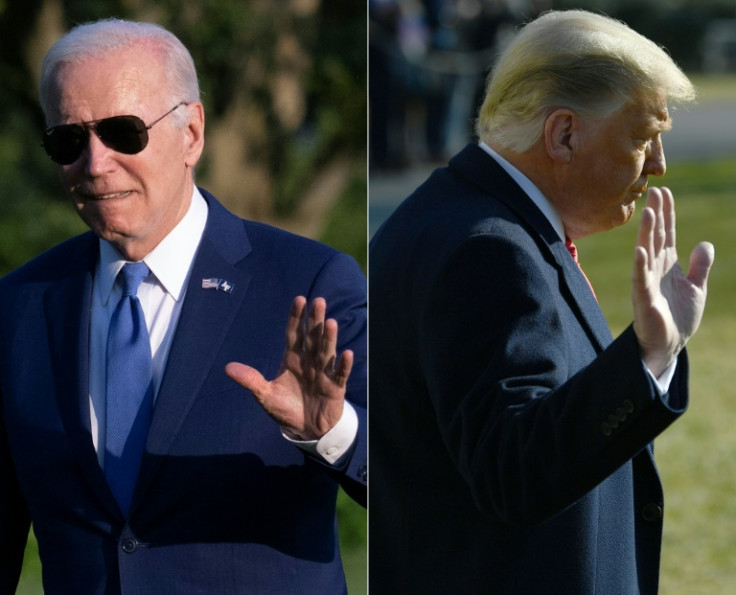Analyzing The 2024 Presidential Landscape: Trump's Surge, Biden's Challenges And Third-Party Dynamics
Amid the unfolding narrative of the 2024 presidential election, recent polling data has provided a compelling storyline, indicating a resurgence in support for former President Donald Trump, who is currently outpacing incumbent President Joe Biden in hypothetical matchups. According to four prominent surveys released over the weekend, Trump's lead ranges from two to five points among registered voters.

In both the Fox News and Wall Street Journal polls, Trump maintained a slender two-point lead over Biden, with margins of 49-47 and 47-45, respectively, well within their respective 2.5% margins of error.
Nearly half of Fox News survey respondents felt that Biden's policies were negatively impacting them and their families, with only about half of Democrats feeling they were benefiting. Additionally, a significant plurality indicated that Trump's policies had been beneficial to them. When asked if they had more disposable income compared to a year ago, most respondents, including two-thirds of independents, reported having less. This sentiment reflects the substantial increase in inflation, although wages have managed to keep pace. Particularly with the surge in gasoline prices, partly attributed to the pandemic, many attributed responsibility to Biden.
The Wall Street Journal poll showed a notable uptick in approval for Biden's handling of the economy, marking a high point in his campaign, with 40% of voters expressing approval. This figure represented a four-point increase from December's findings on the same question.
The Times/Siena survey indicated a slightly broader lead for Trump, with a five-point margin of 48-43, exceeding the poll's 3.5% error margin. In the CBS News/YouGov poll, Trump maintained a four-point lead, with a margin of 52-48, surpassing the poll's 2.8% margin of error.
65% of the CBS News/YouGov poll respondents, when asked about the state of the U.S. economy during Trump's tenure, viewed it favorably. In contrast, only 38% expressed positivity about the current economic situation. Regarding perceptions of inflation under different administrations, respondents were asked whether they believed prices would rise or fall under Trump or Biden's policies. Fifty-five percent believed that Biden's policies would drive prices higher, while only 34% held the same view for Trump's policies.
Despite Biden's efforts to attribute the post-Covid economic recovery to his economic agenda, known as Bidenomics, voters, still feeling the pinch of inflation, have been hesitant to credit him for the robust economy.
However, according to a recent Reuters/Ipsos poll, concerns regarding political extremism or threats to democracy have surfaced as prominent worries among U.S. voters, giving President Joe Biden a slight edge over Donald Trump in the lead-up to the November election. Out of respondents surveyed over three days, 21% identified "political extremism or threats to democracy" as the foremost issue confronting the United States. This figure slightly surpassed those who cited the economy at 19% and immigration at 18%. Also, Biden's approval rating stood at 37%, nearing the lowest point of his presidency and dropping by one percentage point from the previous month.
Results from another recent national poll conducted by Schoen Cooperman Research reveal that among registered voters surveyed, 36% expressed greater concern about President Biden's mental fitness, compared to 33% who cited concerns about Former President Trump's legal issues and ethical conduct. Additionally, 22% indicated equal levels of concern about both issues.
Another notable contrast between the two candidates is the level of enthusiasm among their respective party bases: while a majority of Democratic and lean-Democratic voters (54%) express opposition to Biden's nomination, whereas nearly 70% of Republican or lean-Republican voters advocate for Trump as their party's choice.
While Democratic voters lean towards favoring Vice President Kamala Harris as the nominee should Biden withdraw, she faces an 11-point deficit against Trump in a hypothetical presidential matchup. Conversely, Michelle Obama emerges as the second-preferred option among Democratic voters, with both her and Trump tied at 45 percent in our presidential scenario.
The economic landscape is also proving to be a pivotal factor in shaping voter opinions. Looking ahead, the 2024 election landscape remains uncertain, with conflicting views on the trajectory of the race. However, Trump's lead in recent polls underscores the formidable challenge facing Biden and underscores the importance of key issues such as the economy and democracy in shaping voter sentiment.
© Copyright IBTimes 2024. All rights reserved.





















